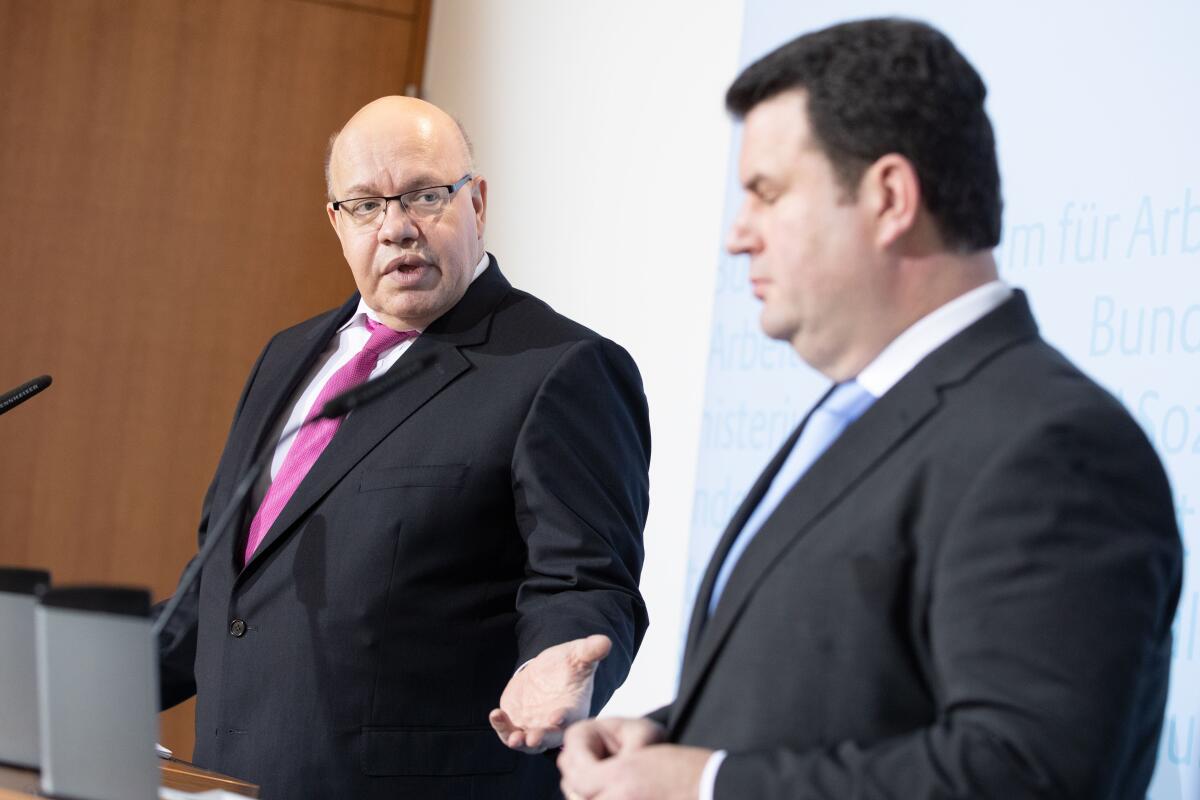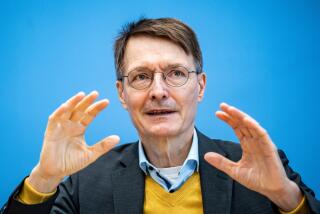Germany’s extensive medical network apparently helped in early stage of coronavirus

- Share via
BERLIN — Germany seems to have weathered the early phase of the coronavirus scare with fewer deaths than many nations, reporting only two fatalities out of 1,457 recorded cases as of Tuesday.
Many health professionals point to a variety of reasons for the results so far, including that Germany, a leader in the 27-nation European Union, has some built-in advantages that could help keep the mortality rate noticeably lower than many countries.
Germany has a widespread network of regional laboratories and was able to do extensive testing for coronavirus when it became known in recent weeks. It has one of the most expensive and extensive public healthcare systems in the world with national healthcare insurance for everyone.
Germany also is considered to have one of the world’s highest concentrations of hospitals — 1,900 for a population of 82 million. And workers, who traditionally see high levels of job security in the country, tend to stay home when they notice symptoms of an illness.
Some medical professionals and political leaders said in recent days that the number of people infected with the coronavirus and the resulting deaths are bound to increase substantially, but that Germany certainly has benefited from preparation and other factors.
Italy has been struck harder, leading Prime Minister Giuseppe Conte to announce Monday that all 60 million Italians would face limitations on movement. Virus deaths in Italy, Europe’s hardest-hit country, had climbed to more than 460 and total cases had reached nearly 9,200 at the time.
“We were first of all lucky that Italy was the first country in Europe hit so Germany got advance warning and had some time to brace for it inevitably moving here,” Christoph Specht, a doctor and disease specialist, said in an interview Tuesday.
“German authorities had a head start and were able to move to quickly cancel some big events, issue public warnings about hygiene that are being heeded and do other important things to try to slow down the spread,” Specht said. “We’re lucky too that relatively few of those infected here are elderly, unlike in Italy.”
In addition to its network of hospitals, the country apparently has benefited from and its formidable Gesundheitsamt structure of public health offices that exert rigorous controls, enforcing rules and regulations on hygiene and healthcare. There are more than 300 public health offices across the country and they are endowed with considerable authority.
Chancellor Angela Merkel moved to make sure the nation remained calm when concerns arose immediately after the swift cancellation in late February of the world’s largest tourism convention, the ITB with 160,000 people from around the world on their way to Berlin. It seemed like a draconian measure at the time when hardly anyone in Germany had been infected.
“The conditions to deal with the virus in Germany are among the best in the world,” Merkel said confidently.
In addition to the hundreds of deaths in Italy, at least 30 people have died in France and Spain and more than 25 in the United States.
Christian Drosten, a leading virologist at the Charite hospital in Berlin, said there was no guarantee that the situation in Germany wouldn’t change dramatically.
There were 35,000 coronavirus tests done in private practices last week with an unknown number also being carried out at hospitals, according to the KBV German Assn. of Physicians. The country has ramped up capacity and can now perform 12,000 tests per day.
Karl Lauterbach, a leader in parliament for the center-left Social Democrats, said on German Radio on Tuesday that the country’s crisis management had worked well “but that advantage can quickly be lost in the next phase.”
Germans call in sick an average of 17 days per year, according to government figures. They visit their doctors an average of 17 times per year as well, according to a 2016 survey by the KBV physician association.
The German government has also stepped in with pragmatic measures to make it easier for companies hit hard by the pandemic to receive state support to help them pay furloughed workers rather than resorting to layoffs. It also appealed Monday to organizers to cancel all public events with more than 1,000 people in an effort to slow the spread of the virus.
North Rhine-Westphalia, where hundreds of people have tested positive, on Tuesday announced that all events with more than 1,000 participants would be immediately canceled — meaning many professional soccer games there would be postponed or played in empty stadiums.
Some residents said many older Germans, who often are the most vulnerable to the virus, appeared to be staying away from potentially crowded areas or stores that might be seeing a run on merchandise by people looking to stock up on supplies such as noodles or toilet paper.
“The older people know all about extraordinary times from the war and are staying under cover at home,” said Martin Floeter, a 55-year-old electrician in Berlin who helps take care of his elderly parents. “They know how to get by with next to nothing. My parents are staying put at home and aren’t going anywhere these days.”
Agnes Skorupa, a physical therapist at a busy Berlin hospital, said that some participants at fitness courses she teaches were staying away. Subways and buses in Berlin also appeared emptier in recent days while the roads have felt jammed with more motorists switching away from public transportation.
“They’re just staying away from everyone and everything,” Skorupa said. “My courses are half empty and the cafes in my neighborhood that are usually full are mostly empty now too.”
Kirschbaum is a special correspondent.
More to Read
Sign up for Essential California
The most important California stories and recommendations in your inbox every morning.
You may occasionally receive promotional content from the Los Angeles Times.










